Short profiles of SARE-funded research and education projects in action.
Showing 1-10 of 43 results
Producer Partnerships Demonstrate the Benefits of Integrated Systems: Increased Profits and Soil Health
In the semiarid climate of the Great Plains, persistent drought is increasingly contributing to crop failure and soil erosion. A recent North Central SARE Research and Education grant in Kansas demonstrated how integrating crops, livestock and cover crops could help some producers offset revenue loss and failing crops. Kansas State University’s Dr. Augustine Obour partnered […]

The Value of Farming with Community
Shakera and Juan Raygoza talk about why their bonds with local consumers, families, schools, agricultural educators and other farmers are beneficial for both them and for the community where they live and farm. They operate Terra Preta Farm on 15 acres in Edinburg, Texas, where they grow organic radishes for wholesale markets and run a […]

Using Flowering Insectary Borders to Boost Natural Enemies
Beneficial insects play an important role in managing insect pests and pollinating crops, but they struggle to thrive in and around farms that have low plant diversity and rely mainly on tillage. Routine soil disturbances and low plant diversity can mean fewer prey, shelter and plant-based resources available to support natural enemies, especially early in […]
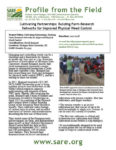
Cultivating Partnerships: Building Farm-Research Networks for Improved Physical Weed Control
Managing and controlling weeds can be a challenge and a frustration for farmers, no matter the farm size or crop. Associate professor of horticulture at Michigan State University, Daniel Brainard, knows that weed management represents a major barrier to sustainable production of both field and vegetable crops. Brainard has been researching new tools and techniques […]
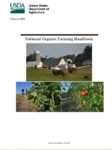
Growing the Field for Organic Conservation
As producers work to meet regulations under the National Organic Program (NOP) and become certified organic, they often apply conservation practices that align well with the Natural Resources Conservation Service’s (NRCS) conservation activities, such as green manures, buffer strips, and rotational grazing. NRCS assistance is being sought by both new and established organic farmers to […]

Climate-Sustaining Agriculture
Often, farmers are willing to make changes in their growing practices to reduce their greenhouse gas (GHG) emissions and their climate impact. Whether conventional or organic, agriculture can be a source of GHG emissions. Those farmers eager to modify their practices may lack the knowledge and tools to make effective choices. According to graduate student […]
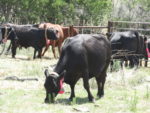
Researchers Say Hill-Climbing Cows May Bring Big Benefits for Western Ranchers
Conventional wisdom says cows don’t go up steep slopes. They don’t climb hills and don’t travel very far from water. But some cows never got that memo. “I’ve been watching cattle for years, and there are always some cows that just take off for the hills, like they didn’t know they weren’t elk,” said Derek […]
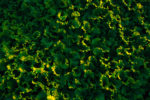
Vegetable and Weed Degree-day Models
Pest managers are familiar with the concept of using degree days to predict pest outbreaks. Insects, like many other organisms, develop according to the temperature around them and degree days are a way to measure accumulated temperature. Plants – at least in part – also develop based on temperature, so a team in Oregon is […]
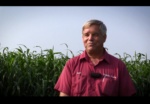
Innovative Assessment Helps Farmers in the Northeast Improve Soil Health
Improving soil health without understanding the soil's condition is not easy and traditional soil tests, though important management tools, don't provide information on the physical structure or microbial life living in the soil. That is why a multidisciplinary team at Cornell University created a soil health assessment, which measures physical, chemical and biological indicators as […]

Integrating Traditional Foods with Aquaponics in the Desert Southwest
The Challenge Cochise County, Arizona, where Aaron Cardona’s Arevalos Farm is located, is classified by the USDA as a food desert with high poverty rates, as well as high rates of diabetes and obesity. To help confront these problems, Cardona decided to look into aquaponics, which had not been experimented with in the desert regions […]